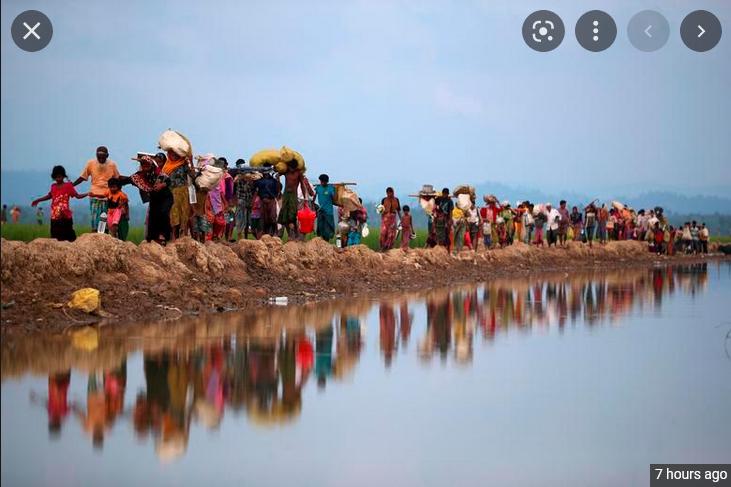Africa-Press – Gambia. THE promise of a safe return for more than a million Rohingyas who left their homes in one of the worst humanitarian crises of 2017 is still unfulfilled nearly five years later.
The question of how long Bangladesh will continue to be a victim of evil ethnic cleansing campaigns carried out by other nations arises after five years.It is merely calculating the cost of the crime against humanity committed by the Myanmar Army in forcing its civilians to flee.
Bangladesh provided refuge to such a sizable number of Rohingyas, just out of humanitarian consideration.
Amid this, a piece of good news is that on July 22 the International Court of Justice (ICJ) rejected Myanmar’s initial objections to the lawsuit that The Gambia had filed under the international Genocide Convention.
The case centres on the alleged genocide committed by Myanmar against the ethnic Rohingya community in Rakhine State between October 2016 and August 2017.
In Rakhine State, the Rohingya people have endured decades of institutionalised discrimination, statelessness and targeted violence.
Since many years ago, this persecution has driven Rohingya women, girls, boys and men into Bangladesh, with notable peaks following severe attacks in 1978, 1991 to 1992, and once more in 2017.
However, the largest and fastest refugee influx into Bangladesh occurred in August 2017.
Families were split and massacred in Myanmar, and women and girls were subjected to gang rapes in addition to entire villages being burned to the ground.
The majority of those who managed to flee were deeply traumatised as a result of witnessing the horrors inflicted by the Myanmar Army.The world’s largest refugee camp is now located near Cox’s Bazar in Bangladesh, where these people temporarily took asylum.
The most persecuted minority group in the world is still the Rohingyas.
When genocide take place, the victims are left with enduring memories which could be psychologically unstable for children growing up in camps.
Many commentators think the Rohingya refugees are a ticking time bomb which the relevant authorities must deal with immediately.
After taking into account everything said above, it can be concluded that if the Rohingya situation is not resolved in the ensuing days, a variety of threats will materialise that could endanger the stability, peace and security of the entire region.
The question now is whether Myanmar will go from a strategy of gradual rehabilitation of Rohingyas to one that is more fervent.
Rohingya refugees have been a significant drain on Bangladesh’s economy and environment over the past five years.
It goes without saying that Bangladesh wants to end the Rohingya problem through peaceful talks and that it is expecting Myanmar and the international community to reciprocate similarly.
For the refugees to return home safely, with security and dignity, the international community must keep up pressure on Myanmar to establish a favourable climate.
To force Myanmar to accept the Rohingyas back, we anticipate a more assertive diplomatic response from the international community.
To give the refugees a haven away from the atrocities of their own government’s ethnic cleansing campaigns, Bangladesh has taken in an increasing number of them since 2017.
Although a noble humanitarian act, this has clearly been a significant burden for the country to bear.
Despite several requests for aid from the international community in ensuring the refugees’ safe return, little has been done.
This is mostly because the Rohingya population will likely continue to face threats and mass genocide in their native country.
Therefore, a safe return may not be possible until the Myanmar government is made to answer for its atrocious crimes.
But there is reason for optimism. The decision made by the ICJ last week regarding Myanmar’s objection to genocide may have a significant impact on how Bangladesh handles the current situation.
Myanmar’s opposition would be overruled by the ICJ, allowing the case to proceed and exposing the country’s misdeeds to the world for judgment.
This is quite promising since it may help ensure a safe return process. However, there are still certain issues to be resolved in this regard.
The duration of the lawsuit would also prevent the Rohingya from returning to Myanmar, which is perilous and difficult for both the refugees and Bangladesh.
Furthermore, it is impossible to effectively enforce the decision of the World Court.
Despite any potential worries, there is no denying the significance of this decision which will advance the cause and guide Bangladesh’s next steps.
For far too long the entire world has been ignoring this humanitarian tragedy.
Regardless of the ruling’s outcomes, Bangladesh must act swiftly to put an end to Myanmar’s brutality and assist the Rohingya in returning.
Bangladesh is also overcrowded due to its enormous population of around 170 million people.
The adverse socio-economic and environmental effects of housing a million evicted refugees have put Bangladesh to the test, particularly in light of the several international problems that have resulted from the recent Russia-Ukraine crisis.
Additionally, it appears that due to Russia’s actions in Ukraine, the Rohingya issue has received less attention globally.
Reiterating (as world-conscious citizens) our support for the Ukrainians, Bangladesh implores the world authorities to remain aware of the Rohingya situation.
The Rohingya crisis is a global issue, so the world community has no moral right to ignore it and let Bangladesh bear the burden alone.
Finally, we implore world leaders and the UN to ensure the swift and impartial repatriation of the Rohingya people to their country of origin.
The possibility of the Rohingyas joining separatist movements and fueling greater geopolitical upheaval will increase the longer their repatriation is postponed.
Bangladesh needs to intensify more diplomatic efforts at this time for mounting immense international pressure on Myanmar.
For More News And Analysis About Gambia Follow Africa-Press






